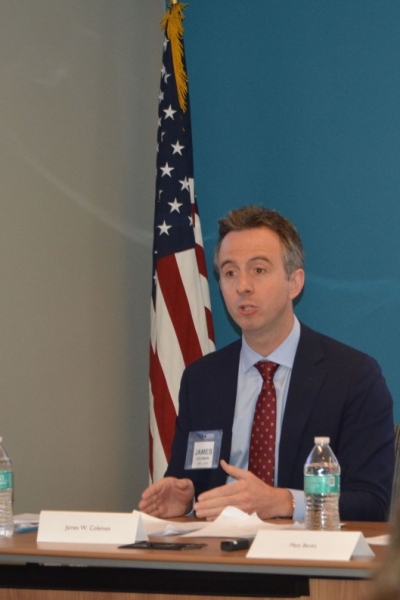When a public company describes the impact of a proposed regulation, it must consider two audiences: regulators and financial markets. It would like to sway the regulator by emphasizing how stringent regulations could cause job losses or reduce investment. But it may wish to convince investors that the company will thrive in the face of any plausible regulatory outcome. These conflicting incentives may lead to inconsistent messages and fuel a perception that industry submissions to both audiences are often “cheap talk.” Despite the common perception that corporations exaggerate the economic impact of regulation and anecdotal reports of inconsistencies between comments to regulators and reports to investors, there has been no empirical study of this question—until now.
|
Prof. James W. Coleman presenting his
paper at the ELPAR Conference. |
In a Harvard Environmental Law Review article titled How Cheap Is Corporate Talk? Comparing Companies' Comments on Regulations With Their Securities Disclosures, Prof. James W. Coleman compared comments companies submitted on EPA’s Renewable Fuel Standard rulemakings between 2009 and 2013 with their contemporaneous annual statements describing their exposure to regulatory risk. Professor Coleman presented his findings at this year’s Environmental Law & Policy Annual Review (ELPAR) conference. Convened each year by ELI and the Vanderbilt University Law School, ELPAR brings academics and experts together to discuss innovative, policy-oriented ideas from legal academia, which are highlighted in the August issue of ELR’s News & Analysis. Edited by Vanderbilt students and one of ELR’s most popular issues, ELPAR digests some of the best ideas from the academic literature in a short, readable fashion accompanied by expert, balanced commentary.
Coleman’s article demonstrates that oil companies facing costly regulations tailor their messages to each audience—emphasizing the cost and economic danger of regulation to regulators, while telling shareholders that regulation is merely a cost of doing business with few negative impacts. On the other hand, corporations anticipating beneficial regulations—the ethanol companies planning on mandates for their product—present a more consistent and cautiously optimistic forecast in both fora.
Coleman suggests that environmental regulators should monitor corporate securities disclosures to ensure that they are given an accurate picture of the true regulatory risk they may (or may not) be imposing. He also suggests that the Securities and Exchange Commission and private plaintiffs scrutinize companies’ written comments to determine what regulatory risks they are pointing out to regulators without disclosing them to investors. Finally, Coleman recommends that corporate counsel align these two sets of statements to protect public companies from securities litigation and enhance their credibility in each forum.
Alan Horowitz, former Vice President, Global Safety, Health, Environment, Sustainability & Operations Compliance, AstraZeneca; Jeffrey A. Smith, Co-Director of Fordham Law School Sustainability Initiative and retired partner, Cravath, Swaine & Moore LLP; and Brian J. Wong, Senior Counsel, U.S. Securities and Exchange Commission, wrote responses to How Cheap Is Corporate Talk, all of which are included in this month’s issue of News & Analysis. The 2017 ELPAR also includes articles and commentary on climate exactions, the president’s budget, and options to purchase conservation easements. Click here to learn more about past ELPAR conferences.
ELI is making this featured News & Analysis article available free for download. To access all that ELR has to offer, including the full content of News & Analysis and its archive, you must have a subscription. To learn more, visit www.elr.info.

